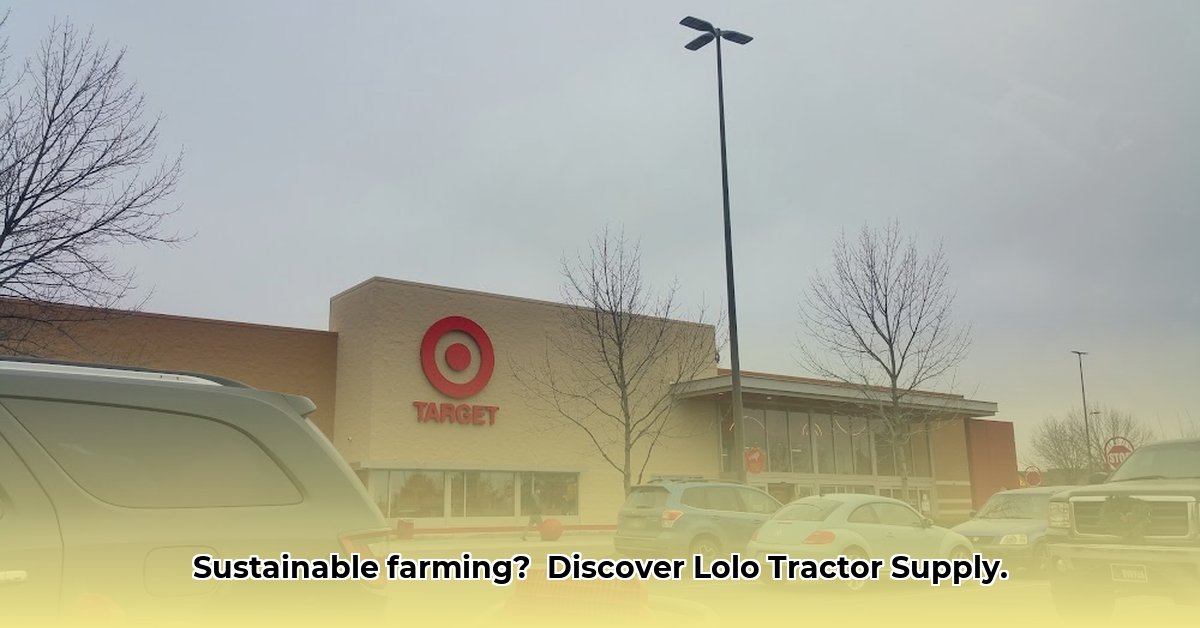
Exploring Tractor Supply's Role in Sustainable Lolo Agriculture
Lolo Tractor Supply (LTS), a prominent retailer in the Montana agricultural landscape, provides a wide array of products for farmers and gardeners. However, the extent of its contribution to sustainable farming practices in Lolo requires closer examination. While LTS stocks essential supplies like seeds, tools, and animal feed, the degree to which it actively promotes eco-friendly farming methods remains unclear. This article investigates LTS's potential to support sustainable agriculture in Lolo, highlighting both opportunities and challenges. For more information on LTS's products, check out their website.
LTS's Product Offerings and Their Sustainability Implications
LTS offers the tools necessary for farming, but the ultimate impact on sustainability depends on the choices individual farmers make. The selection of organic seeds, adoption of water-saving irrigation, and responsible pest management all significantly influence the environmental footprint of local agriculture. While LTS provides the resources, it's the farmers' decisions that determine the overall environmental outcome. Currently, readily available data regarding LTS's supply chain practices (sourcing, packaging, etc.) and community involvement in environmental initiatives is limited, hindering a complete assessment of its role in sustainable agriculture.
Opportunities and Obstacles for a Greener Future
LTS possesses significant potential to become a leader in sustainable agriculture in the Lolo region. Workshops focusing on water conservation, soil health improvement, and responsible pest control could significantly benefit local farmers. Furthermore, partnerships with local environmental groups could amplify LTS's impact. However, a major obstacle is the lack of transparency concerning the environmental impact of their products and packaging. A comprehensive analysis of their supply chain sustainability is needed to fully understand their environmental footprint.
Collaboration: Key to Sustainable Agricultural Success
Sustainable farming requires a collaborative approach. LTS, as a key supplier, holds a crucial position. The challenge lies in transitioning from simply providing resources to actively promoting and supporting sustainable farming practices. Open communication and proactive community engagement are critical components of this transformation. This goes beyond offering organic seeds; it involves collaborating with local farmers, delivering educational resources, and leading community-wide sustainability initiatives. This is an ongoing process that requires sustained commitment.
Key Stakeholders and Their Roles:
Local Farmers & Gardeners: Should carefully evaluate product options, seek advice from LTS staff, and advocate for a broader selection of sustainable products.
Lolo Tractor Supply: Needs to conduct a comprehensive review of its supply chain’s sustainability, develop and implement programs that promote sustainable agriculture, and forge partnerships with environmental organizations.
Local Government & NGOs: Should support LTS’s sustainability efforts, integrate sustainability into agricultural planning and policies, and aid local eco-friendly initiatives.
Building Partnerships and Transparency: The Path Forward
The future of sustainable agriculture in Lolo hinges on collaboration. LTS's role is central, as it provides essential resources. The key to success lies in transitioning from a supplier to a true partner in sustainable practices. Transparency and open communication with the community are crucial. While there's significant potential, considerable questions remain. Further investigation into LTS's sourcing, packaging, and community engagement is needed to comprehensively assess its impact on sustainable agriculture in Lolo. Continued research and dialogue are essential to understand its full role and how it can best contribute to a sustainable future.
How to Support Sustainable Agriculture Practices at Lolo Tractor Supply
Three Pivotal Points:
- The success of sustainable agriculture practices relies heavily on informed decision-making by individual farmers and ranchers.
- Lolo Tractor Supply's potential to promote sustainable practices is significant, but requires greater transparency and proactive engagement.
- Collaborative efforts among farmers, LTS, and local organizations are essential for achieving a more sustainable agricultural future.